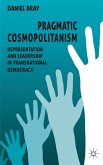This book invites people to think more deeply about human rights in an attempt to overcome many of the traditional arguments in the human rights literature. Belden Fields argues that human rights should be reconceptualized to combine philosophical, historical, and empirical-practical dimensions. The best way to understand human rights is not as a set of universal abstractions but rather as a set of past and ongoing social practices rooted in the claims and struggles of peoples against what they consider to be political, economic, or social domination. Fields aptly shows how a people's fight for recognition is often closely tied to rights claims and that these connections to identify can help bridge the gulf between universalistic and cultural relativistic arguments in the human rights debate.








